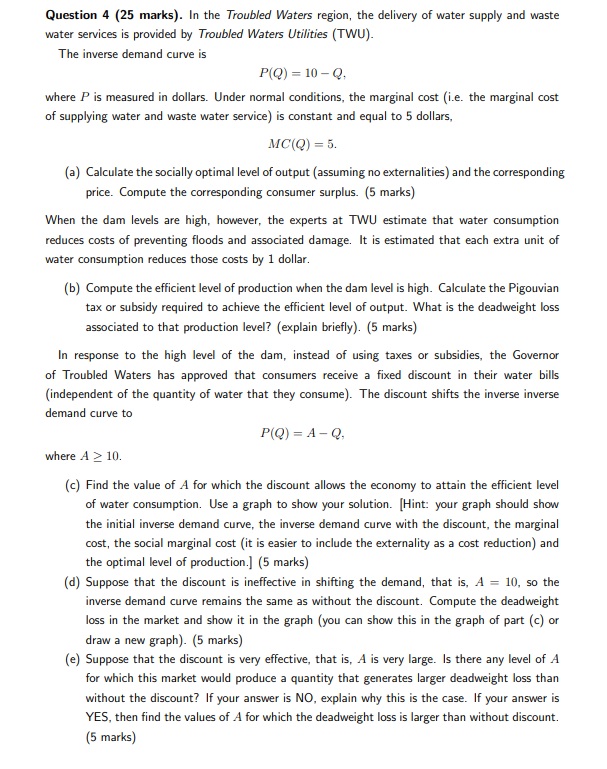Answered step by step
Verified Expert Solution
Question
1 Approved Answer
Show all working Please. Question 4 (25 marks). In the Troubled Waters region, the delivery of water supply and waste water services is provided by

Show all working Please.
Question 4 (25 marks). In the Troubled Waters region, the delivery of water supply and waste water services is provided by Troubled Waters Utilities (TWU). The inverse demand curve is P(Q)=10Q, where P is measured in dollars. Under normal conditions, the marginal cost (i.e. the marginal cost of supplying water and waste water service) is constant and equal to 5 dollars, MC(Q)=5. (a) Calculate the socially optimal level of output (assuming no externalities) and the corresponding price. Compute the corresponding consumer surplus. ( 5 marks) When the dam levels are high, however, the experts at TWU estimate that water consumption reduces costs of preventing floods and associated damage. It is estimated that each extra unit of water consumption reduces those costs by 1 dollar. (b) Compute the efficient level of production when the dam level is high. Calculate the Pigouvian tax or subsidy required to achieve the efficient level of output. What is the deadweight loss associated to that production level? (explain briefly). (5 marks) In response to the high level of the dam, instead of using taxes or subsidies, the Governor of Troubled Waters has approved that consumers receive a fixed discount in their water bills (independent of the quantity of water that they consume). The discount shifts the inverse inverse demand curve to P(Q)=AQ, where A10. (c) Find the value of A for which the discount allows the economy to attain the efficient level of water consumption. Use a graph to show your solution. [Hint: your graph should show the initial inverse demand curve, the inverse demand curve with the discount, the marginal cost, the social marginal cost (it is easier to include the externality as a cost reduction) and the optimal level of production.] (5 marks) (d) Suppose that the discount is ineffective in shifting the demand, that is, A=10, so the inverse demand curve remains the same as without the discount. Compute the deadweight loss in the market and show it in the graph (you can show this in the graph of part (c) or draw a new graph). (5 marks) (e) Suppose that the discount is very effective, that is, A is very large. Is there any level of A for which this market would produce a quantity that generates larger deadweight loss than without the discount? If your answer is NO, explain why this is the case. If your answer is YES, then find the values of A for which the deadweight loss is larger than without discount. (5 marks) Question 4 (25 marks). In the Troubled Waters region, the delivery of water supply and waste water services is provided by Troubled Waters Utilities (TWU). The inverse demand curve is P(Q)=10Q, where P is measured in dollars. Under normal conditions, the marginal cost (i.e. the marginal cost of supplying water and waste water service) is constant and equal to 5 dollars, MC(Q)=5. (a) Calculate the socially optimal level of output (assuming no externalities) and the corresponding price. Compute the corresponding consumer surplus. ( 5 marks) When the dam levels are high, however, the experts at TWU estimate that water consumption reduces costs of preventing floods and associated damage. It is estimated that each extra unit of water consumption reduces those costs by 1 dollar. (b) Compute the efficient level of production when the dam level is high. Calculate the Pigouvian tax or subsidy required to achieve the efficient level of output. What is the deadweight loss associated to that production level? (explain briefly). (5 marks) In response to the high level of the dam, instead of using taxes or subsidies, the Governor of Troubled Waters has approved that consumers receive a fixed discount in their water bills (independent of the quantity of water that they consume). The discount shifts the inverse inverse demand curve to P(Q)=AQ, where A10. (c) Find the value of A for which the discount allows the economy to attain the efficient level of water consumption. Use a graph to show your solution. [Hint: your graph should show the initial inverse demand curve, the inverse demand curve with the discount, the marginal cost, the social marginal cost (it is easier to include the externality as a cost reduction) and the optimal level of production.] (5 marks) (d) Suppose that the discount is ineffective in shifting the demand, that is, A=10, so the inverse demand curve remains the same as without the discount. Compute the deadweight loss in the market and show it in the graph (you can show this in the graph of part (c) or draw a new graph). (5 marks) (e) Suppose that the discount is very effective, that is, A is very large. Is there any level of A for which this market would produce a quantity that generates larger deadweight loss than without the discount? If your answer is NO, explain why this is the case. If your answer is YES, then find the values of A for which the deadweight loss is larger than without discountStep by Step Solution
There are 3 Steps involved in it
Step: 1

Get Instant Access to Expert-Tailored Solutions
See step-by-step solutions with expert insights and AI powered tools for academic success
Step: 2

Step: 3

Ace Your Homework with AI
Get the answers you need in no time with our AI-driven, step-by-step assistance
Get Started


